
|
Amid the Great Reshuffle many Americans are reconsidering their careers. A large number left their jobs in 2022 or are contemplating doing so. Although these feelings are present across all demographics, it’s impossible to paint every dissatisfied worker with the same brush. To dig a little deeper into the specifics of what exactly people regret, across different industries and stages of life, we surveyed more than 1,000 professionals at all stages of their career. The data shows that workers across generations and industries share similar regrets about their careers but that some vary by circumstance.
Professionals who are in the middle or late stages of their career have more to look back upon, and young workers may have the opportunity to learn from the regrets of these experienced professionals.
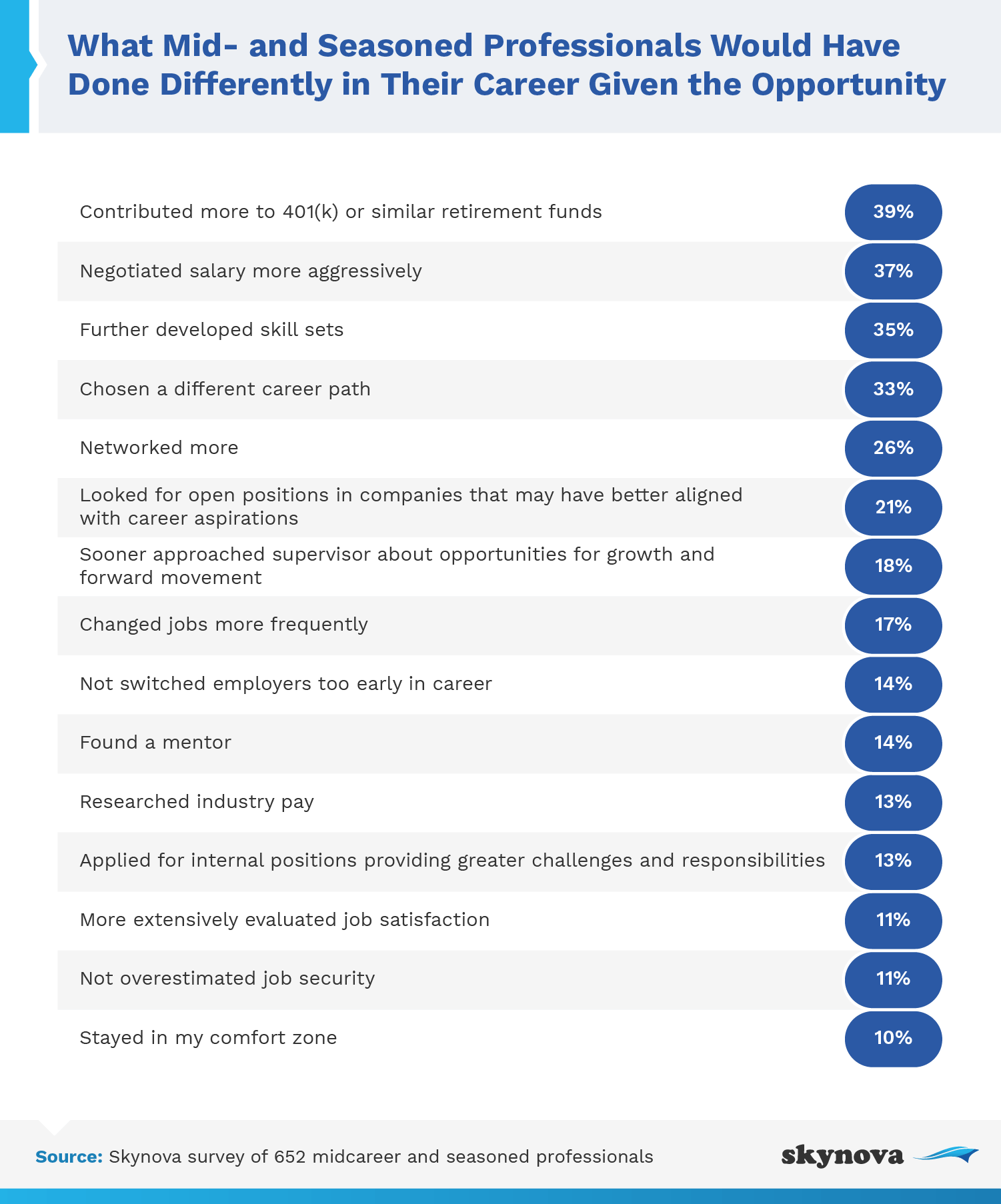
We found financial decisions to be the biggest source of regret for professionals with significant experience under their belt, especially where retirement savings and salary negotiations were concerned. Thirty-nine percent stated they wished they had contributed more to retirement funds, while 37% felt they should have been more vocal about deserving a higher wage. More than 1 in 4 professionals also indicated they wish they’d done a better job of networking in the workplace.
Two opposite regrets appeared with similar frequency: Among workers interviewed, 17% said they should have switched jobs more frequently early on, while 14% wish they had not switched as often as they did. As a rule of thumb, experts recommend six years as the ideal average length of time to spend in any given position. But when professionals are early in their career, they are still learning about their own work preferences and aptitudes, and it could take a few tries to find their niche. If, early on, workers do not switch often and then find themselves unhappy in their later careers, it might be because they prioritized stability or general career advice at the expense of less tangible — but still important — considerations, like fulfillment and emotional well-being.
Different seasons of life bring different challenges, and each stage of a career can bring unique opportunities for mistakes or victories. Our respondents tended to rank their regrets differently based on which stage of their career they were in.
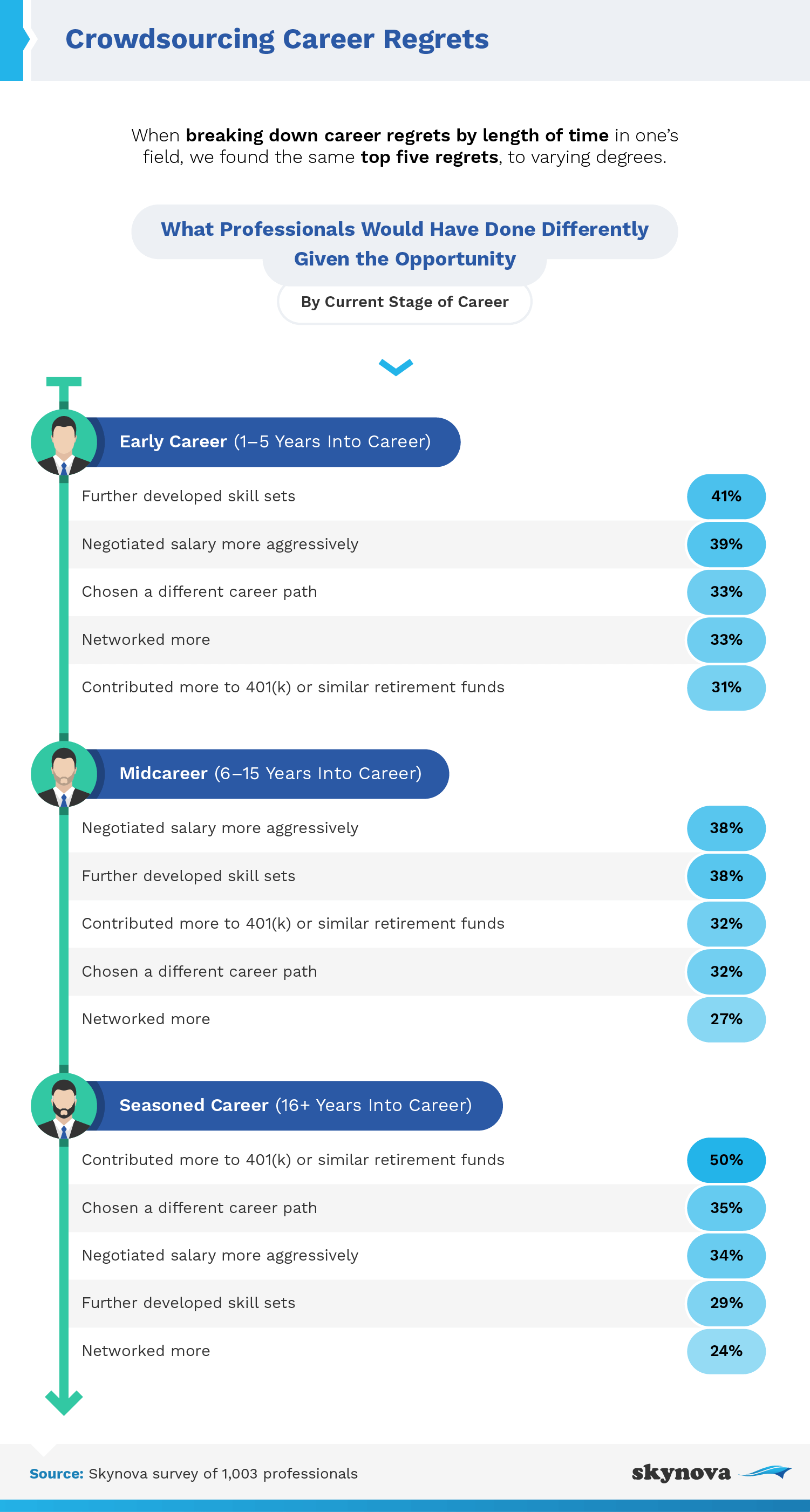
Although the top five regrets among early, mid-level, and seasoned career professionals were the same, there are some key differences in the order they ranked. Professionals with five or fewer years of experience most wished they had developed more skills, while those with 6 to 15 years of experience most regretted not negotiating their salary more aggressively. Seasoned professionals, 16+ years into their career, were beginning to wish they’d put away more for retirement.

Regrets broken down by generations showed similar patterns as those sorted by career length. Overall, baby boomers tended to have lower regret rates than other generations. Although all generations had money-related regrets in their top three rankings, Gen Z was the only generation that did not wish they’d contributed more to a retirement fund to the extent that it became a top three regret.
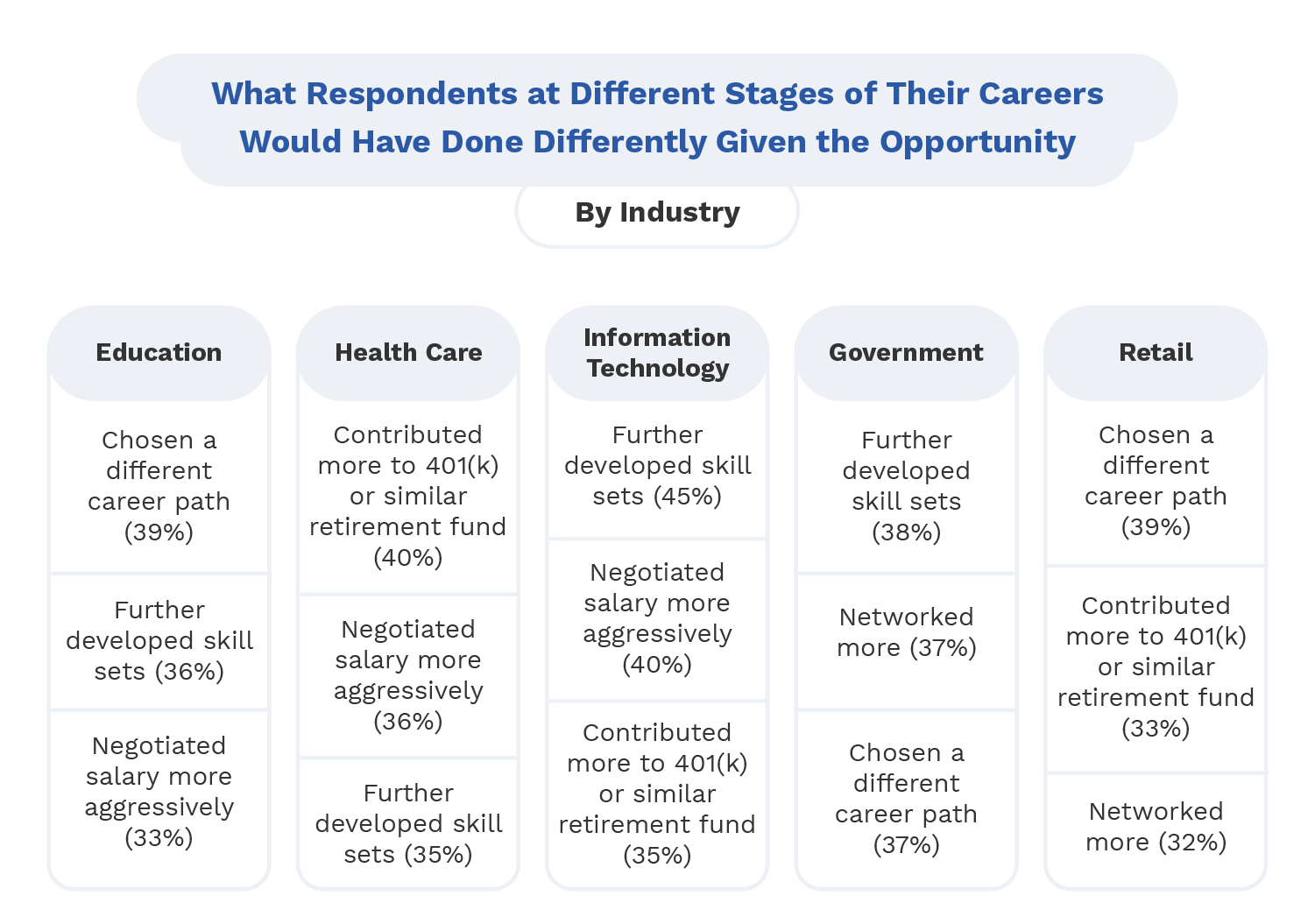
By industry, there was much more variance. Thirty-nine percent of respondents in both the education and retail industries and 37% in government wished they’d chosen a different career path, suggesting a lesser degree of job satisfaction than those in the health care and information technology industries. Regretting not having developed more skills was highest in the information technology and government sectors, at 45% and 38%, respectively, possibly reflecting a greater need for continued education in those careers when compared to others.
In the third section of our study, we asked mid-level and seasoned career professionals what they wished they had done differently before their careers started.
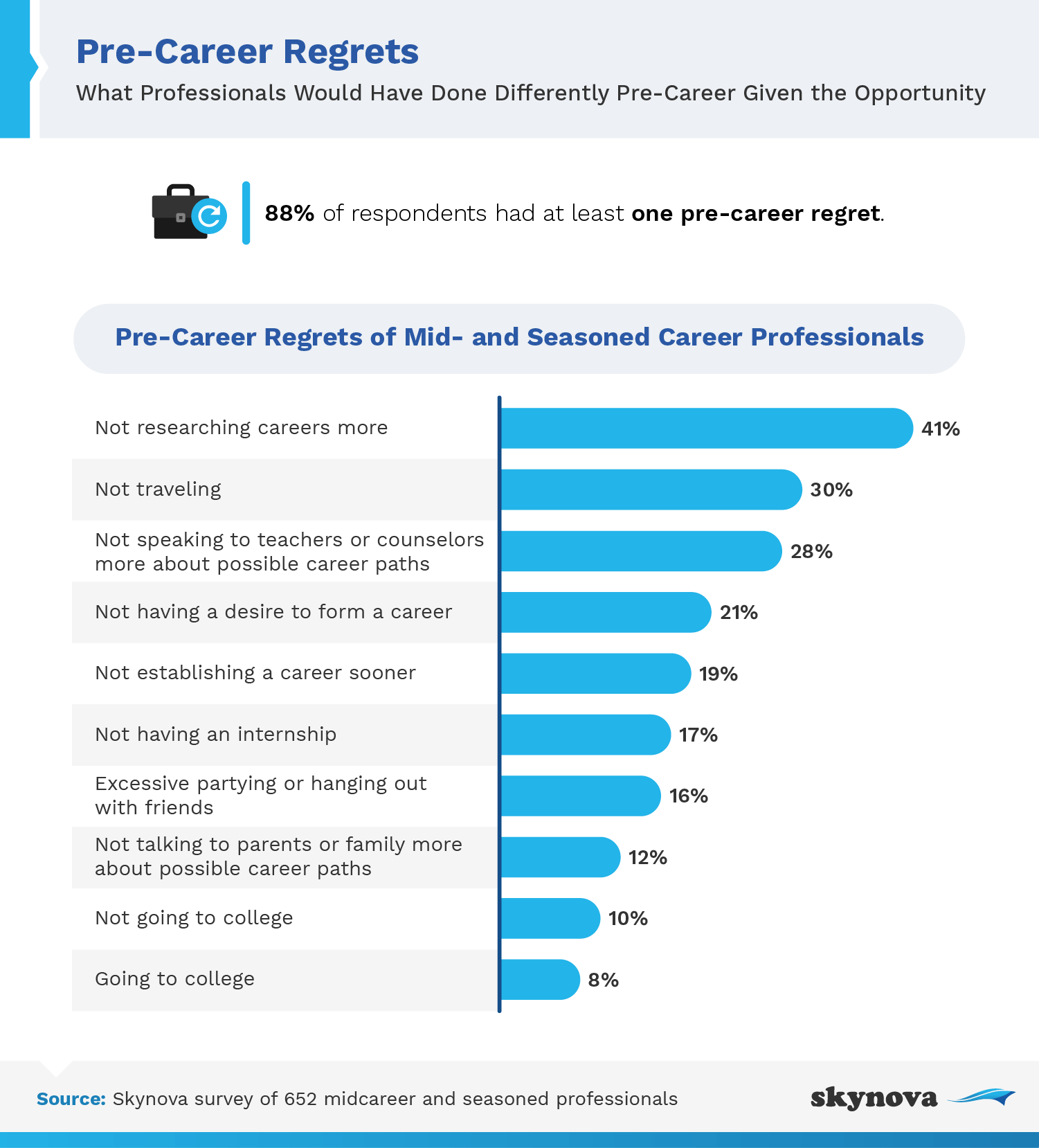
By far, the biggest pre-career regret was not having done more in-depth research about what jobs were available. Forty-one percent of respondents felt that they would have benefited from knowing more about the job market at a younger age, presumably so they could either prepare for their current career more strategically or choose another career entirely, in which they might have been more fulfilled or successful. Growing up, most people are only exposed to the professions represented in their households, at school, and what they see in popular culture, so many young people may be unaware of the full breadth and variety of professional opportunities available to them, perhaps impacting what they choose to pursue early on in their career.
About as many respondents regretted going to college as those who regretted not going, 8% and 10%, respectively. Further, plenty of professionals had regrets related to relationships and communication. Twenty-eight percent regretted not talking to adults at school about career plans, 12% regretted not talking to their family about it, and 16% felt that they had prioritized their social life at the expense of planning for the future. This suggests that it’s important not just to communicate basic information about career paths and the skills needed for them, but also to address the intangible cultures surrounding young people, so they understand the importance of talking to people about their path and seeking support when making critical decisions.
In this section, we analyze the motive contributing to candidates’ thinking about resigning in the year 2022, as the Great Resignation and Reshuffling continue to impact workplaces. Like other questions studied, financial considerations elicited the highest number of responses.
With 71% of job seekers selecting it as a reason for their future departure, salary was by far the biggest factor contributing to dissatisfaction. It is likely that companies will need to increase wages if they wish to retain these employees. To retain younger employees and those in IT, support for continuing education may also play a role.
Two in 5 professionals seeking new employment also complained of a toxic work environment — a serious issue that can impact a business’s productivity, retention rates, social climate, and long-term success.
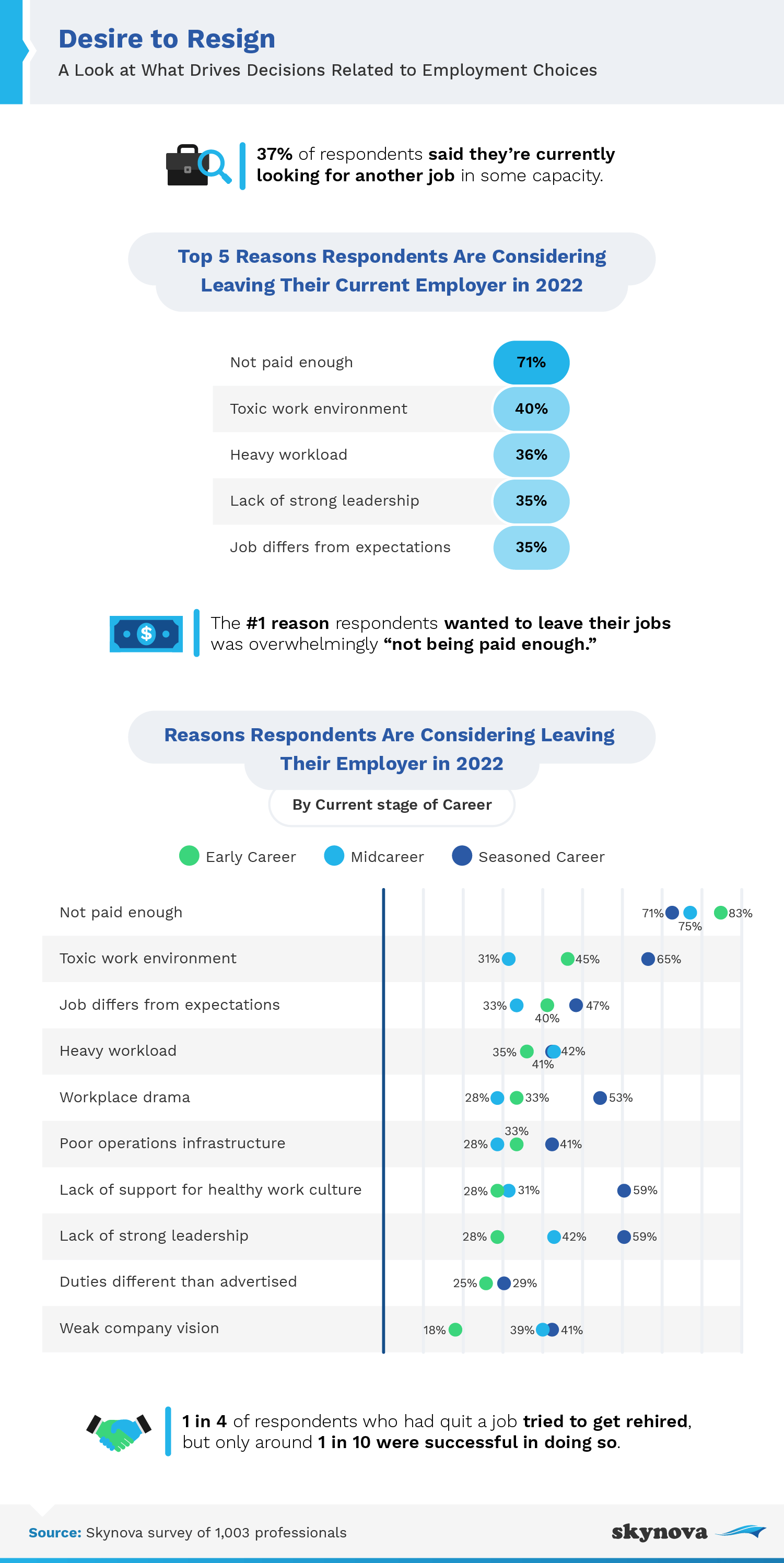
For employees who quit their jobs while in good standing with their employer, it may seem that reapplying for a position at the company down the road is a viable option. However, this strategy doesn’t work for everyone: A quarter of people we surveyed who had quit a particular job in the past later tried to get rehired, but only 10% of those efforts were successful. Having different experiences, 27% of respondents said they had used new job offers to argue for higher salaries, indicating that sometimes resignation is more of a conversation starter than an ultimate conclusion.
Additionally, 33% of respondents recommended not resigning until another job is lined up, but 12% of those surveyed advised leaving if it would mean being happier. These opposite reactions reflect different understandings of work-life balance and, possibly, conflicting experiences of resignation outcomes.
Although young professionals were the most dissatisfied with their earnings, wages were the top concern for workers at every stage of their careers. Understanding this pain point is critical. It can be difficult to find work, and people wouldn’t go on the job hunt voluntarily if it seemed like there were better, more accessible options available. But there are other factors at play as well.
Among seasoned professionals considering resignation, most perceived workplace drama more frequently than younger workers, with 53% listing it as a concern, compared to only about 27% of mid-level professionals. In fact, these seasoned professionals had higher degrees of dissatisfaction with more job elements overall. So although pay was the top source of dissatisfaction, there were clearly other problems that required addressing.
In this section, we analyze results through the lens of general age rather than time spent in a career.
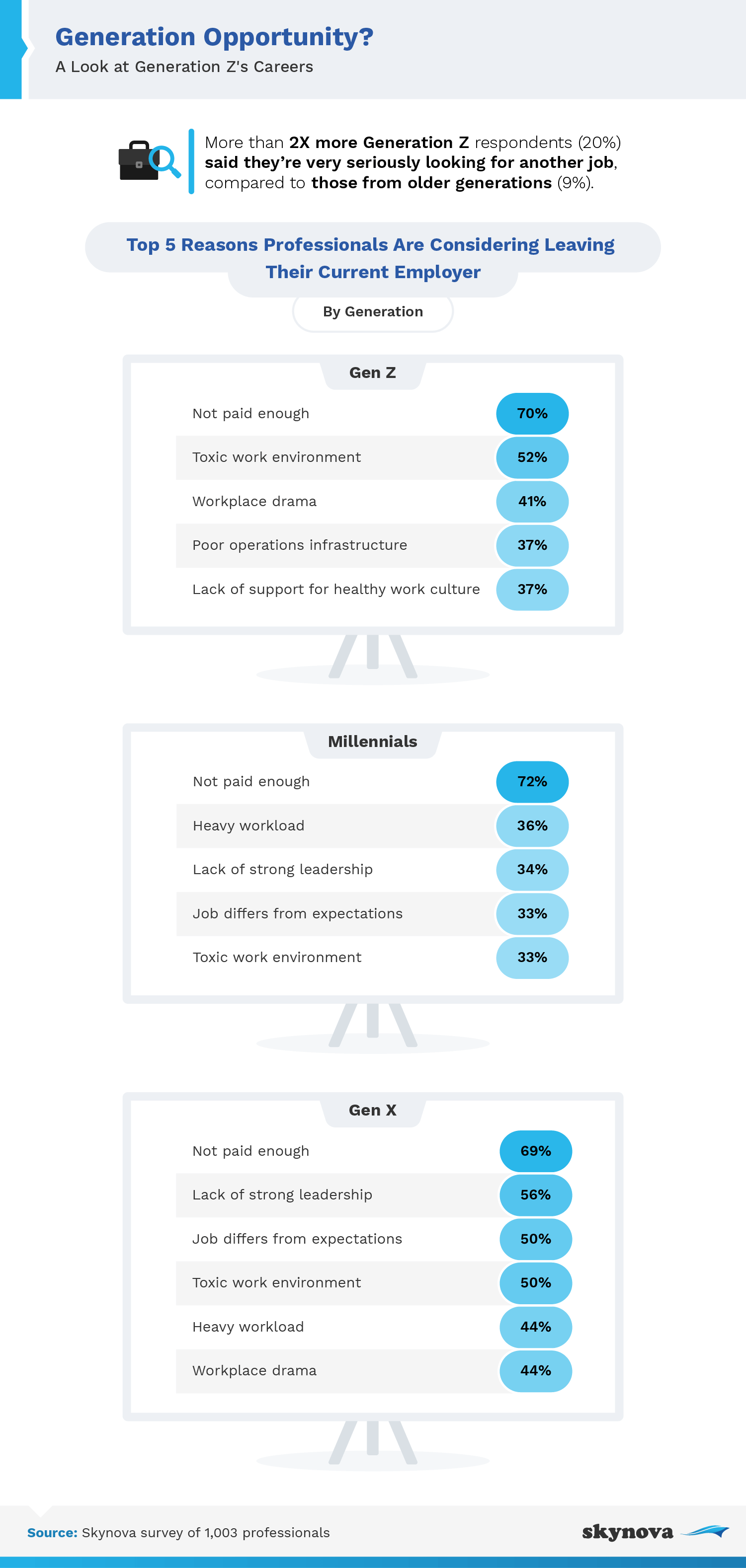
Millennial and Gen Z workers cited not being paid enough, 72% and 70% respectively, as the main reason for contemplating leaving their current roles in 2022. As Gen Z workers are twice as likely to seriously consider quitting their jobs, it is possible that they are less concerned about the negative consequences.
One common complaint for Millennial and Gen X workers that did not make the top five for Gen Z was a lack of strong leadership. Fifty-six percent of Gen X professionals & 34% of Millennials listed this as a cause for potential resignation, but this concern didn’t make the top ranking for Gen Z. This might be because older workers have had more time to grow in their organizations and consequently get more familiar with the leadership and the internal workings of their organizations.
If you’re a working professional, chances are you can relate to some of the regrets shared by others in this study. Perhaps some of these insights will be helpful in guiding you to avoid the mistakes of those who came before you. The data shows that investing in retirement savings and negotiating for higher salaries can prevent some of the most common regrets that crop up among seasoned career professionals, and upskilling early in your career can help avoid the most common pain point for early career professionals.
If you’re an employer looking for ways to retain your key employees, improving compensation could yield dividends across all experience levels and industries. Support for continuing education, especially amoung younger workers and particular industries, may also contribute to stabilization.
Skynova provides a wide array of user-friendly invoice templates and small business apps.
For this project we surveyed 1,003 career professionals at varying stages of their careers. There were 351 early career, 398 midcareer, and 254 seasoned career respondents. 50% of respondents identified as women, while 48% identified as men, and 2% as nonbinary or preferring not to say. There are some issues with self-reported surveys, like telescoping, selective memory, and lying; respondents were disqualified for failing attention-check questions to better assure the survey results are accurate and answered truthfully.
The career path of a professional is filled with all sorts of unexpected twists and turns, and information can help you navigate that maze. If you’d like to share the findings of this study with your audience or someone you know, you are welcome to make it available to them. Just be sure your purposes are noncommercial and that you link back to this page.